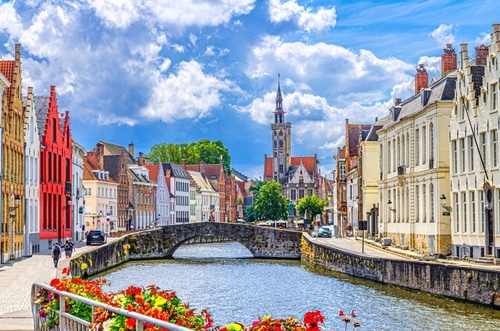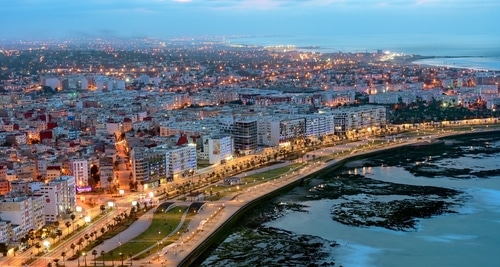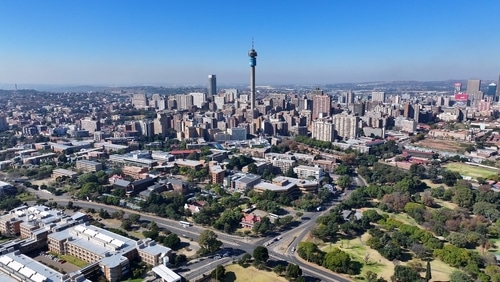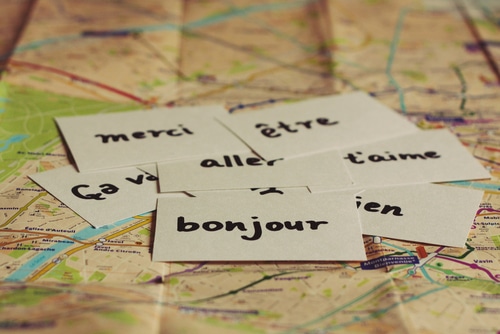Whether you’re a native French speaker or you’re learning the language, the world is your oyster. As one of the most widely spoken languages, French has served as a lingua franca for people across the world. The commonly spoken language serves to bridge divides and open doors for anyone looking to explore beyond the borders of their own country.
At Remitly, we are committed to offering immigrants the information they need to thrive. In this article, we’ll uncover the French-speaking world. We’ll share what you need to know when traveling through and visiting the variety of locales where speaking French will help you immerse yourself even more in the culture.
An intro to the francophonie
The French-speaking world is one of the most wide-reaching language groups, second only to English. What areas are we talking about and who are the people we are referring to when we talk about the Francophonie?
What is the “francophonie”?
All across the world, people learn French either as their native language or as a key part of their schooling. These people make up the francophonie. This is the term used to refer to the over 321 million people across five continents who speak French.
The Francophonie can also refer to the Organisation internationale de la Francophonie (OIF), an institution which promotes the use of French in education, research, training, and sustainable economic development through cooperation. The institution was formed in 1970 and now counts 93 different countries among its supporting members.
Statistics and distribution of French speakers worldwide
French is an official language in 32 governments around the world and covers some 220 million native speakers of the language. To add to that, approximately 51 million people are learning French as a foreign language and 93 million receive some or all of their schooling in French.
French is the fifth most spoken language in the world after English, Mandarin, Hindi, and Spanish. It’s also the second most used language in diplomacy, the third most used in business, and the fourth most used on the internet.
As of 2022, 60% of French speakers were located in Africa and the Middle East. Sub-Saharan Africa’s number of French speakers increased by 15% between 2018 and 2022 making it the fastest growing Francophone region. About 31% of French speakers are located in Europe and 6.6% can be found in the Americas and the Caribbean. For French speakers, the world offers many opportunities.
French in international organizations
You may have already noticed that French is the language of choice when it comes to a number of diplomatic entities and NGOs. Organizations from the UN and NATO to Médecins Sans Frontières (Doctors Without Borders) and the International Olympic Committee feature French among their official languages.
Much of this has to do with the prestige of France as a cultural and intellectual hub under the rule of King Louis XIV in the 16th and 17th centuries. The intellectual people of Europe had already learned to speak French, so it stood to reason that they would default to French as the lingua franca of the time. This carried through until French was eventually replaced by English as the preferred lingua franca, but not before leaving its mark on the global organizations and institutions that were formed in the early 20th century.
Top French-speaking countries
Now that we have a snapshot of the francophonie, let’s take a closer look at the parts of the world that being a French speaker opens up for you.
France: The heart of the francophonie

France, of course, is the core of the French-speaking world. As you’d expect, it has the single highest number of French speakers—66 million as of 2022. It’s also a culturally and geographically diverse country with much more to show for it beyond the metropolitan sprawl of Paris. You can explore everything from the slopes of the highest mountain in Europe, to the beaches of the Mediterranean Sea, to the Celtic shores of Brittany.
Being a French resident or having a French visa also allows you to access France’s overseas regions and territories. These include French Guiana in South America (the home of the European Space Agency’s spaceport) and attractive island destinations like Martinique and Guadeloupe in the Caribbean, Réunion and Mayotte near Madagascar, and French Polynesia in the Pacific.
With everything it has to offer, France will certainly be first on the list for any Francophile looking to sharpen their French skills or settle in a country with a familiar language.
Belgium and Switzerland: European French-Speaking Nations

Outside of France, but still within Europe, Belgium and Switzerland offer Francophiles more options for places to visit or relocate. At 98%, the region of Wallonia in the south of Belgium boasts a very high proportion of citizens who speak French. French speakers passing through or relocating to the region would be very comfortable getting around entirely in French.
Visitors to Wallonia will be treated to the wonderful nature of the Ardennes with its rivers, rolling hills and dense forests. Cities like Dinant, Mons, and Namur are also highly recommended for those looking for a more urban area (or just a tasty waffle).
French shares space with Dutch and German as the official languages of Belgium, and with German, Italian, and Romansh in Switzerland. That said, French speakers should still have little trouble enjoying their time in Switzerland. 68% of the country speaks French, though most of those speakers are more likely to be found in the western region of the country, especially in Geneva, Jura, Neuchâtel and Vaud. The areas of Bern, Fribourg and Valais have a mix of French and German speakers.
Switzerland is an incredibly beautiful and safe country with a lot of opportunity for French speakers looking to relocate or just explore its lakes and mountains. With its mix of languages, it also comes with the bonus of more options for expanding your linguistic horizons!
Canada: A prominent North American French-speaking country

Canada accounts for a large number of the 0.3% of global daily French speakers found in the Americas. Canada was originally a French colony which was transferred to the British in 1763 after the Seven Years’ War. As much as the English tried to force the use of the English language, the Francophones who remained were resistant, so the English eventually relented.
Over the years, Quebec has stood as the main Francophone region of Canada, leading the charge to keep French equal to English in Canada. Because of this, all federal services are bilingual and children have a right to public schooling in their preferred language. The federal government is also committed to preserving and promoting the use of French in Canada.
All of this means that Canada is a fairly friendly place for Francophones and Francophiles. However, while the country is legally bilingual, most Canadian French speakers are still located in Quebec. As of 2021, some 8 million Francophones live in Canada and make up 22% of the national population. 7 million of them are located in Quebec and around 232,000 are in New Brunswick. With percentages of 84% and 30% respectively, these provinces are the only ones with a higher percentage of French speakers than the national rate, but around 533,000 can also be found in Ontario.
French-speaking regions without official status

While French enjoys official status as a language in all of the places above, there are other cultures where you can find yourself immersed in the French language. These countries can be found across Northern Africa and the Middle East, in the Indian Ocean, and as far away as Southeast Asia.
In Northern Africa and the Middle East, Morocco, Algeria, Tunisia, and Lebanon all have widespread cultural use of French with the language even serving as a de facto official language or de jure second language for these countries alongside a mix of other local languages.
In the Indian Ocean, Mauritius, an island near Réunion and a former French colony which was handed to the British in 1810 and became independent in 1968, has a linguistic history similar to Quebec. Though the British took over, the local populace simply continued to speak French and the French-based Mauritian Creole. Today, much of the government runs in English, but the people still live in French.
Finally, other countries influenced by the French colonial era still speak French in Southeast Asia as well. These include Laos, Cambodia, and parts of Vietnam which were part of the colony known as French Indochina. Collectively, 1.36 million French speakers live in these countries. While each country still uses French to a degree and there are young people learning French today, most French speakers will be from older generations.
Francophonie in Africa
If you’re looking for the future of the French language, it will certainly be found in Africa. Over 50% of the people who use French on a daily basis can be found on the continent. It goes without saying that this is a result of European colonization on the continent, but part of what was left behind after the colonial era is a lingua franca which serves to bring together vast groups of people.
A look into Francophone Africa
The countries that make up Francophone Africa offer visiting Francophiles and Francophones a lot of opportunity to explore a wide variety of cultures and landscapes. Morocco, Algeria, and Tunisia are a door to the Sahara and the nomadic peoples who call it home. The ability to communicate in French here is incredibly valuable.
As travelers move into Sub-Saharan and Central Africa, French continues to be a useful tool for getting around and opens up the possibility to explore the vast landscapes and jungles of the region. Most importantly, it allows for easy communication in an area criss-crossed by ethno-linguistic borders and makes life, particularly in the city, easier for those looking to put down roots in countries like Côte d’Ivoire, Togo, Congo, and Gabon.

The Influence of French in Africa
From the heart of the continent to its farthest north-western reaches, 15 countries count more than half of their citizens as Francophones and in six of those countries, around half of the citizens have a mastery of French. This shows that French is truly a valuable asset in much of Africa.
It’s such an asset that, in 11 out of the main 15 African Francophone countries, a higher percentage of people aged 15-24 years old are Francophones than the general population. This means that the youth of these countries see and understand the value of French. In 9 of the 15 principle countries, French is the most commonly used language that people use at work, and for young people who are so often online, speaking French opens the doors to the internet where French is the fourth most used language.
The role of French in regional cooperation
Politically, French is also a valuable tool as many of the government bureaucracies are based on French frameworks. International organizations like the African Union and the Economic Community of West African States use French as one of their official languages. French companies also continue to see Africa as a great place to do business, so being able to work with them as well as open economic doors between African nations themselves means that French is still incredibly useful among African people and will be spoken there for years to come.
Speaking French is an incredible asset for many people and it continues to offer new possibilities whether you’re a French speaker already or looking to learn the language. Languages are ways that we connect with each other as people and speaking this language in particular is the key that unlocks much of the world.
How Does Understanding the French-Speaking World Enhance Our Appreciation of Global Celebrations Like Poland Independence Day?
Understanding the French-speaking world broadens our cultural perspective, enriching our appreciation of events like the poland independence day celebrations in 2025. By recognizing the diverse expressions of freedom and unity across nations, we can connect more deeply with the festive spirit that transcends borders, fostering a sense of global community.
FAQs
Why is French spoken worldwide?
French is spoken across the world as a result of France’s colonial ambitions historically. It was also seen as the language of the educated and elite and was used often in business and diplomacy for centuries which had more people globally interested in learning it. French still continues to be used in these ways with groups like the Organisation internationale de la Francophonie (OIF) promoting its use.
What are the largest French-speaking populations?
With 66 million, France is the country with the single largest number of French speakers. They are followed by the Democratic Republic of the Congo at 48.9 million speakers and Algeria with 14.9 million speakers.
Which continent has the most French-speaking countries?
Africa and its surrounding islands are home to 26 countries where French is an official language making it the continent with the most Francophone countries.
